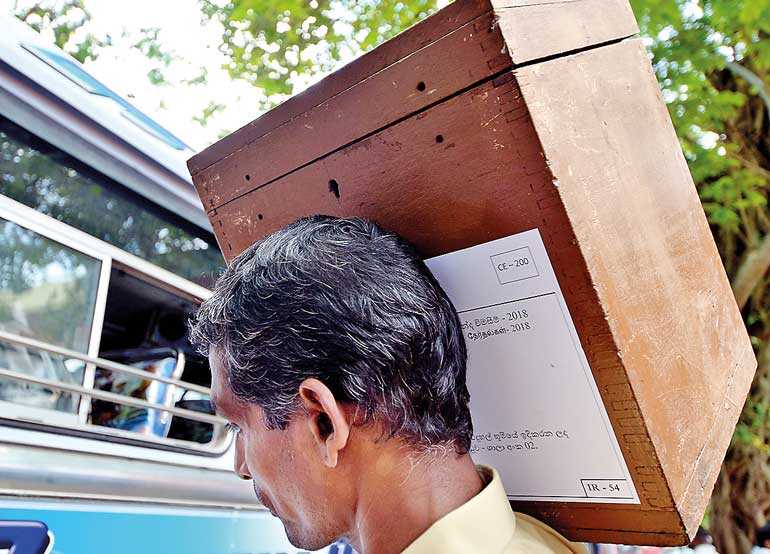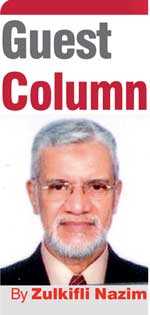Monday Feb 23, 2026
Monday Feb 23, 2026
Thursday, 8 August 2019 00:33 - - {{hitsCtrl.values.hits}}

The people of this country have certainly been bombarded by every conceivable form of manipulation trying to influence an election. Whatever the manipulation people must realise that they may cast their vote; but at the same time they are also casting it away for the next few years. Our voting system worked well for decades, but now it is broken – Pic by Shehan Gunasekara
Jean-Jacques Rousseau, one of the most influential thinkers during the Enlightenment in 18th century Europe, had already observed that elections alone were no guarantee of liberty.
He said: “The people of England deceive themselves when they fancy they are free; they are so, in fact, only during the election of members of parliament: for, as soon as a new one is elected, they are again in chains, and are nothing.”
Presidential and Parliamentary Elections are both arcane instruments of public deliberation.
We may find, that even after the folly of electing Maithripala Sirisena for the presidency in 2015, the oddities of our political system have taken our country down a dangerous road.
Never before has the fate of a country been changed by the single swing of a blunt axe, wielded by disenchanted and poorly informed citizens.
On the surface, everything still seems fine; but that trust in governments and political parties has reached a historical low.
It would appear that people like the idea of democracy but loathe the reality.
Trust in the institutions of democracy is also visibly declining. Everywhere, political parties – the key players in our democracies – are among the least trusted institutions in society. 
What do we see in our politicians and leadership hopefuls?
You can see that every individual who is vying for political power is completely egocentric, trapped inside himself, incapable of empathising or identifying with others, or love, friendship, affection of tenderness. Every politician whether male or female, is a completely isolated unit, incapable of rapport with anyone.
Their responses are entirely visceral, not cerebral; their intelligence is a mere tool in the services of their personal lust, drives and needs; they are incapable of mental passion, mental interaction and cannot relate to anything other than their own physical sensations.
The majority of them are half-dead, unresponsive lumps, incapable of giving or receiving pleasure or happiness; consequently our politicians at best are utter dullards and pudding heads.
Our politicians are trapped in a twilight zone halfway between humans and apes, and are far worse off than the apes because, unlike the apes, they are capable of a large array of negative feelings – hate, jealousy, contempt, disgust, guilt, shame, doubt – and moreover, they are aware of what they are and what they are not.
Every politician, deep down, knows he is worthless. Overwhelmed by a sense of animalism and do not feel and iota of shame in it. The hate and contempt they feels for other men, opposing political factions have become legendary. They are an accursed lot, having a crudely constructed nervous system that is easily upset by the least display of emotion or feeling overlaid with stilted, artificially contrived manners. Their incredulity and scepticism tips over into outright antipathy and aversion.
You will notice that three decades ago, we lived in a world of greater political apathy and yet greater trust in politics. Now there is both passion and distrust. These are turbulent times, as the events of the past few months demonstrate all too clearly. And yet, for all this turbulence, there has been little reflection on the tools that our democracies use.
The people of this country have certainly been bombarded by every conceivable form of manipulation trying to influence an election. Whatever the manipulation people must realise that they may cast their vote; but at the same time they are also casting it away for the next few years. Our voting system worked well for decades, but now it is broken.
There is something explosive about an era in which interest in politics grows while faith in politics declines and our highest civic duty, boils down to an individual action performed in the silence of the voting booth. This blind faith in the ballot box as the ultimate base can have all kinds of outcomes in states that are fragile, including violence, ethnic tensions, criminality and corruption.
This collective hysteria has made election fever permanent and has serious consequences for the workings of democracy. Efficiency suffers under the electoral calculus, legitimacy under the continual need to distinguish oneself, while time and again, the electoral system ensures that the long-term and the common interest lose out to the short term and party interests.
Elections were once invented to make democracy possible, but in these circumstances they seem to be a hindrance.
Since we have reduced democracy to selecting representatives, and reduced representative democracy to mean simply voting, a valuable system is now mired in deep difficulties.
Winning the next election has become more important than fulfilling the promises made. Making the best out of the system we have, is becoming increasingly difficult.
It can be said that elections are the fossil fuel of politics. Once they gave democracy a huge boost, now they cause colossal problems.
While elections certainly exist and can change governments, public electoral debate is a tightly controlled spectacle, managed by rival teams of professionals, expert in the techniques of persuasion, and considering a small range of issues selected by those teams.
We discuss and debate the outcome of an election without discussing its principles.
We are all too familiar with the situation, a politician is engaged or has been engaged in a corruption scandal and an election is on the horizon – you hope and pray that this is the time for the electorate to teach them a lesson that corruption and abuse of power will not be tolerated – you have been in this position quite too often. It sometimes feel like we all have. You are both dumbfounded and outraged that the electorate does not punish corruption and abuse of power but instead the politician or party in question is re-elected.
Their argument is that the ideological position of the voter together with the number of reasonable party alternatives explains why citizens would continue voting for their preferred party despite it being involved in a corruption scandals. They identify that there is a supply and demand issue, with voters seeking effective party alternatives alongside where these effective alternatives are in line with their ideologies or political beliefs.
Their argument is a convincing one – that may explain why those accused of corruption consistently are not punished by the electorate – that their position of the political spectrum determines their ability to survive corruption allegations.
For the media, politics is now a soap opera. The most popular politicians are those who succeed in altering the script. Imagine having to develop a system today that would express the will of the people. Would it really be a good idea to have them all queue up at polling stations every four or five years with a bit of card in their hands and go into a dark booth to put a mark next to names on a list, names of people about whom restless reporting had been going on for months in a commercial environment that profits from restlessness?
Consequently the final outcome is that the mass of citizens play a passive, quiescent part, responding only to the signals given to them. Hence the country is back to its chaotic state after the elections.
Democracy is not, by definition, government by the best – elected or not. It flourishes precisely by allowing a diversity of voices to be heard. It is all about having an equal say, an equal right to determine what political action is taken.
In order to keep democracy alive, we will have to learn that democracy cannot be reduced to voting alone. Elections and referendums become dangerously outmoded tools if they are not enriched with more sensible forms of citizens’ participation. Structured deliberation with a random sample of citizens’ promises to generate a more vital, dynamic and inclusive form of democracy.
And lastly, a point to ponder: “A people that elect corrupt politicians, imposters, thieves and traitors are not victims... but accomplices” ― George Orwell.
The writer counts over 50 years in the insurance industry and is an Associate of the Chartered Insurance Institute (London) and also holds the title of Chartered Insurance Practitioner; as well as an Associate of the Insurance Institute of India. He can be reached via email at [email protected].